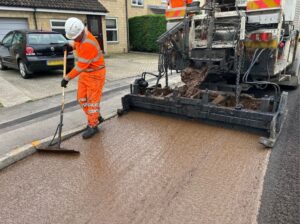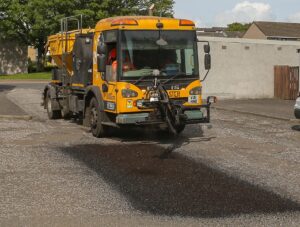Over 8,000 potholes and defects have been fixed on the roads of Cumbria following a summer campaign with road maintenance specialists Velocity.
A fleet of Velocity’s state-of-the-art machines was deployed throughout the county’s network to bring roads back up to standard using their innovative Velocity Patching technology.
The spray-injection patching technique pioneered by Velocity is a three-stage process that allows hundreds of defects per day to be permanently repaired at a fraction of the cost of traditional methods, helping to clear backlogs and keep traffic moving.
High-pressure air is used to clear defects before cracks and fissures are sealed using emulsion bond coat. The machine then evenly coats aggregate in emulsion which is then applied to the defect at high velocity, compacting from the bottom up.
Repairs are completed in minutes and are ready for traffic immediately.
Over the campaign, up to seven machines and skilled operators were deployed. Working on a find and fix routine, machines visited roads identified for maintenance and repaired every defect in a single visit as well as carrying out preventative work to defects that are below the intervention level to avoid return visits.
During a period of high absences of the council’s own highways team due to a Covid spike, the working method was switched to Velocity’s teams working on category 1 defects that required immediate attention, allowing the council to better deploy their own skilled teams for other important highways duties.
Councillor Keith Little, cabinet member for highways and transport for Cumbria County Council said: “We find the repairs to be very good. We monitor the repairs on a regular basis and over the years have found that Velocity does quality repairs. It doesn’t need road closures or excavation, and they’re doing it to the same standard as we’re doing on a permanent basis.
“Because Velocity can do the repairs for about £15 per square metre, which is a lot cheaper than we can do with conventional methods, we get good value for the rate-payers and the Department for Transport.”
The project is the third year that company has been working in Cumbria. As repairing roads, the company recently introduced a new product to prevent potholes and defects from occurring – Velocity Preservation – which keeps roads in a good condition and extends their lifespan using Rhinophalt.
Developed by ASI, Rhinophalt is a unique product that has been applied to assets around the world over 20 years. Containing Gilsonite, a naturally occurring bitumen, the product is a resin that is applied onto the road surface, penetrating to depths of over 30mm. Rhinophalt sets hard in any microcracks and air voids, preventing the ingress of water and oxidisation that causes defects and potholes to occur.
The treatment is particularly suited to roads that are in ‘green’ to ‘light amber’ condition. Once treated, the road is protected for five years when the process is repeated, stretching the lifespan out to 23-24 years before it needs to be resurfaced.
Gavin Blogg, business development manager at Velocity said: “Velocity Patching is focused on the red and amber conditioned parts of the network which are in need of maintenance. It quickly brings them up to standard at the most economically advantageous cost.
“Velocity Preservation is suitable for roads in green or light amber condition – those that are in good condition. It keeps them in a steady state so that they don’t deteriorate any more, preventing costly interventions.
“With these two services, we can offer local authorities proven maintenance methods throughout the lifespan of their assets that will make their budget go further.”
As well as reducing the financial cost of maintenance the techniques both bring significant carbon savings, helping local authorities on the road to net-zero. Velocity Patching is 100% cold applied with no excavation or waste-to-landfill. Treating roads with Velocity Preservation has demonstrated a reduction of 94% compared to conventional maintenance methods.
























